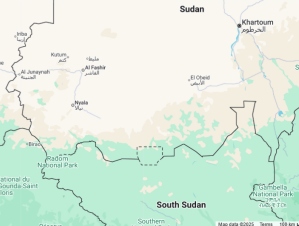
Sudan last week deported more than 100 predominantly Christian, South Sudanese women from Khartoum in what critics say was for both religious and political reasons.
At least 61 of the deported women were separated from their children, according to Radio Tamazuj, in what sources said was a blatant violation of human rights. Christians said the government views South Sudanese dimly as a threat to Islam and to security, though most of the deported women had lived in the country for decades.
Authorities raided houses of South Sudanese in various parts of Khartoum, jailing women without legal aid or due process, sources said. Children were also arrested and deported without their parents.
The deported women told Al-Watan, a South Sudanese Arabic newspaper, that officials refused to allow them to return for their children, ages 3 months to 12 years. Some of the women were arrested from their homes at around 2 a.m., while others were arrested on the streets as they went to markets.
“I came empty-handed, leaving behind my two kids ages 3 and 9, and nobody is taking care of them,” one of the women reportedly said.
Another told Al-Watan she was jailed in Omdurman and deported the following day, leaving behind nine children.
Authorities transferred the women to detention centers and later deported them to the Joda border area for passage into South Sudan’s Upper Nile state, Diing Deng Lueth, commissioner of Renk County, told Radio Tamazuj.
One of the deported mothers, Triza Alier, reportedly said that police told her, “Your children are not our concern.”
Alier said police arrested her off the street without allowing her to return home to her children.
Another deported woman, Sabah Abbass, told Al-Watan she was jailed for four days and was beaten for asking for water or food.
“It was inhumane,” she said.
Solana Jeremiah, head of a civil society network in South Sudan’s Upper Nile state, called the deportations “unacceptable,” according to Radio Tamazuj. Critics said that, as a member of the United Nations, Sudan is obligated to uphold international law and the Geneva Conventions, including the fundamental principle of non-refoulement – not returning refugees to a place where their lives are in danger.
“South Sudan, from which these people fled a brutal civil war, remains that dangerous place,” Jwothab Othow commented on the Radio Tamazuj website. “The recent deportation of South Sudanese refugees from Sudan, which involved forcibly separating children from their parents, constitutes a grave violation of international law and a profound crime.”
Muslim extremists have recently taken to social media to incite the public to send South Sudanese Christians, many of whom were born in Sudan, to South Sudan.
South Sudan’ population is 56 percent Christian, according to the Joshua Project; 34.1 percent of citizens practice ethnic traditional religion, and 9.4 percent are Muslim.
Sudan is 93 percent Muslim, with adherents of ethnic traditional religion 4.3 percent of the population, while Christians constitute 2.3 percent, according to Joshua Project.
The action comes amid a civil war that broke out between the paramilitary Rapid Support Forces (RSF) and the Sudanese Armed Forces (SAF) in April 2023.
Both the RSF and the SAF are Islamist forces that have attacked displaced Christians on accusations of supporting the other’s combatants.
The conflict between the RSF and the SAF, which had shared military rule in Sudan following an October 2021 coup, has terrorized civilians in Khartoum and elsewhere, killing tens of thousands and displacing more than 11.9 million people within and beyond Sudan’ borders, according to the U.N. Commissioner for Human Rights (UNCHR).
The SAF’s Gen. Abdelfattah al-Burhan and his then-vice president, RSF leader Mohamed Hamdan Dagalo, were in power when civilian parties in March 2023 agreed on a framework to re-establish a democratic transition the next month, but disagreements over military structure torpedoed final approval.
Burhan sought to place the RSF – a paramilitary outfit with roots in the Janjaweed militias that had helped former strongman Bashir put down rebels – under the regular army’s control within two years, while Dagolo would accept integration within nothing fewer than 10 years.
Both military leaders have Islamist backgrounds while trying to portray themselves to the international community as pro-democracy advocates of religious freedom.
Sudan was ranked No. 5 among the 50 countries where it is most difficult to be a Christian in Open Doors’ 2025 World Watch List (WWL), down from No. 8 the prior year. Sudan had dropped out of the top 10 of the WWL list for the first time in six years when it first ranked No. 13 in 2021.
Following two years of advances in religious freedom in Sudan after the end of the Islamist dictatorship under Bashir in 2019, the specter of state-sponsored persecution returned with the military coup of Oct. 25, 2021. After Bashir was ousted from 30 years of power in April 2019, the transitional civilian-military government had managed to undo some sharia (Islamic law) provisions. It outlawed the labeling of any religious group “infidels” and thus effectively rescinded apostasy laws that made leaving Islam punishable by death.
With the Oct. 25, 2021 coup, Christians in Sudan feared the return of the most repressive and harsh aspects of Islamic law.
The U.S. State Department in 2019 removed Sudan from the list of Countries of Particular Concern (CPC) that engage in or tolerate “systematic, ongoing and egregious violations of religious freedom” and upgraded it to a watch list. Sudan had previously been designated as a CPC from 1999 to 2018.
In December 2020, the State Department removed Sudan from its Special Watch List.





